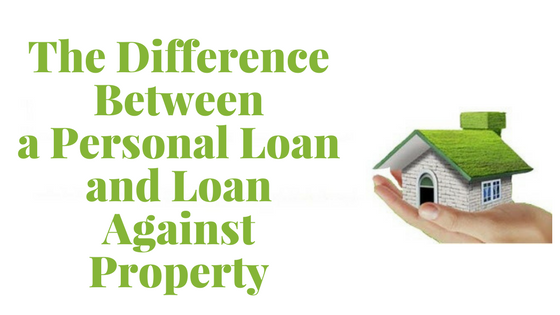What is the Difference Between a Personal Loan and Loan Against Property?
 A middle-class person tries to save his money all his life thinking, that someday it will be sufficient for him to cover any financial crisis. While savings are considered as the best way to finance your needs, there are some things which cannot be afforded through savings. To cover the financial gap for your various needs, you can apply for a loan from a financial institution of your choice.
A middle-class person tries to save his money all his life thinking, that someday it will be sufficient for him to cover any financial crisis. While savings are considered as the best way to finance your needs, there are some things which cannot be afforded through savings. To cover the financial gap for your various needs, you can apply for a loan from a financial institution of your choice.
Basically, there are two types of loan that you can apply for, in order to cover your financial needs:
- Loan against property (LAP)
- Personal Loan
But you need to make sure that you have ample information about both of them before applying.
- Personal Loan:
Personal Loans are unsecured loans and have no restrictions. You can avail a Personal Loan for different purposes. You do not need to offer any collateral to your lender to apply for a Personal Loan. You just need to have a good CIBIL Score, an employment history of more than 3 years and a clean bank account history.
- Loan Against Property:
Loan against property is a type of secured loan, where you offer property as security interim to the lender for the loan. It can be residential, commercial or even a piece of land. It is similar to Personal Loan and has no restrictions on how you use the loan amount. You can use the loan amount to cover expenses like weddings, medical emergencies, and higher education.
While Both Are Almost Similar, Which One to Choose?
Both the loans might seem similar but you can differentiate on the following grounds:
- Processing Time: Loan against property has collateral like the property involved. For this, the lender may verify the details and the technical aspects of the property. These types of verifications take time as the properties have many documents involved and verifying each and every document can take a long time. Usually, the verification of documents can take 10 to 15 days and the loan will take more time to get processed and sanctioned after that.
On the other hand, in Personal Loans, you don’t need to offer collateral to the lenders. You just need to have a good credit score, job history, and proper account history. The financial institutions take up to 72 hours to sanction the loan. So, if you are looking for a loan approval within a short period of time, then loan against property might not be suitable for you.
- Interest Rate: Secured loans have low-interest rates as compared to unsecured loans. The interest rate on loan against property ranges from 11 percent to 16 percent. While interest rates on Personal Loans range from 11 percent to 24 percent, but there are some NBFCs who provide a Personal Loan at 12 percent.
Interest rates can make a huge difference on your final repayment amount, you need to make sure that you examine the interest rates of both the loans before applying.
- The Tenor of the Loan: Tenor is the duration taken to repay the entire loan debt. The tenor of the loan also impacts the repayment of the loan. If you apply for a loan with a longer tenor, the EMI will be lower, but the interest amount that you pay will be higher, whereas, if you choose a shorter tenor, you will have to pay a higher EMI; however, the total amount of interest you will pay will be lower.
If you avail a Personal Loan, the interest rate might be higher while the tenor is limited to 5 to 10 years. The loan against property has a higher tenor, with the interest rate depending on the tenor of the loan.
Choosing the loan depends on your financial conditions at the time of applying. It is important to examine all the aspects, terms and conditions of the loan before you make your decision.
Category: Loans




